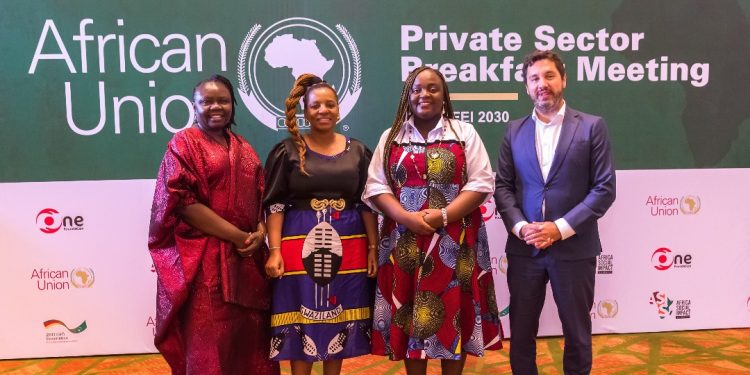Since its inception in 2022, the Women and Youth Financial and Economic Inclusion (WYFEI 2030) Initiative has emerged as a flagship program of the African Women’s Decade on Financial and Economic Inclusion (2020–2030), creating multi-stakeholder platforms to advance targeted financial inclusion strategies for women and youth across Africa.
At a recent high-level convening organized by the African Union Commission’s Women, Gender, and Youth Directorate, in partnership with the Sterling One Foundation and supported by the German Federal Ministry for Economic Cooperation and Development (BMZ) through the GIZ African Union Portfolio, stakeholders renewed commitments to mobilize private sector capital and expertise to close persistent financing gaps for underserved populations.
The meeting, held ahead of the Africa Social Impact Summit (ASIS 2025), set an ambitious target: unlocking $100 billion to support at least 10 million African women and youth by 2030.
Opening the dialogue, Prudence Nonkululeko Ngwenya, Director of the AU Commission’s Women, Gender, and Youth Directorate, called for systemic reforms that place women and youth at the center of resource allocation, policymaking, and accountability.
“The private sector is not a guest at this table, but a co-owner of the agenda,” she said. “WYFEI 2030 is designed for co-investment, innovation, and scale to move from isolated impact to ecosystem change.”
Olapeju Ibekwe, CEO of Sterling One Foundation, stressed that inclusion must translate into action:
“Women and youth are not peripheral to Africa’s economy. Any agenda that sidelines them is incomplete. Every day capital doesn’t reach them, opportunity is withheld from the continent.”
She called for partnerships that move from alignment to shared execution, reflecting Africa’s unique investment realities.
Dr. Tobias Thiel, Director of GIZ African Union, underscored that tackling systemic barriers to inclusion is both a moral and economic imperative. He urged stakeholders to act boldly to create an Africa where opportunity is truly equal and potential is limitless, reaffirming GIZ’s commitment to WYFEI 2030.
Driving Scalable Solutions
The convening featured a panel discussion of public and private sector actors, which explored:
Mobilizing private capital for underserved markets
Designing gender- and youth-responsive financial products
Building market infrastructure and data systems to make small entrepreneurs bankable
Providing technical and business development support for women- and youth-led enterprises
A highlight of the event was the introduction of the EmpowerHer Africa initiative by Dr. Nadi Albino, Deputy Director of Partnerships at UNICEF. This transformative program aims to empower 50 million adolescent girls and young women with access to financing, technology, and entrepreneurial resources under the WYFEI 2030 framework, nurturing the next generation of innovators and leaders.
The AU Commission’s Women, Gender, and Youth Directorate, alongside Sterling One Foundation, will anchor a series of public–private dialogues across the continent in the coming months. These engagements aim to:
Mobilize strategic private and development financing
Foster co-investment opportunities for gender-responsive ventures
Unlock innovative financial solutions to remove systemic barriers
Generate scalable and measurable progress toward Africa’s inclusive economic transformation
With WYFEI 2030 targeting ecosystem-level change, these efforts are expected to accelerate women’s and youth’s economic empowerment, reduce structural inequalities, and position Africa as a hub of inclusive and sustainable growth by 2030.










